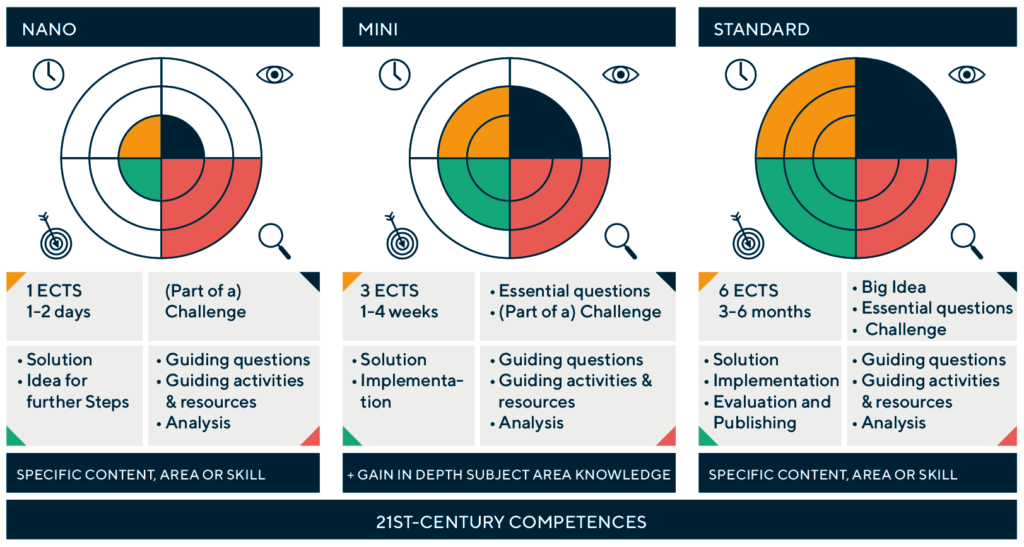Challenge-Based Learning in more Detail
Challenges start with a big idea
Challenge-based learning offers many possible benefits from establishing new teaching and learning practices which are aligned with work-life environments and increasing employability for students. Authentic learning experiences allow students to explore, discuss, and meaningfully construct concepts and relationships in contexts that involve real-life challenges and projects that are relevant to the learner.
The Challenge-based learning approach follows a specific structure, which consists of three main steps: engage, investigate and act.
STEP1: ENGAGE
The engagement phase begins with a Big Idea. This is a broad theme or concept that can be explored in multiple ways and is important to the learner and a larger community, for example health or public transportation. Next, all the participants, teachers, students and external partners make sure that they agree on the final question to work on. The challenge turns the final question into a call to action to learn deeply about the subject.
STEP2: INVESTIGATE
Investigation phase makes sure all participants of the challenge contribute with their knowledge and skills concerning and conduct activities to create a foundation for actionable and sustainable solutions. Activities could include: simulations, experiments, projects, problem sets, research, and games. The Investigation phase concludes with reports and presentations that demonstrate the learners have successfully addressed all of the questions and developed clear conclusions that will set the foundation for the solution.
STEP3: ACT
Solutions are developed and implemented with an authentic audience and the results evaluated in Action phase. Here partners can use gained and shared knowledge to actually design and prototype new solutions. The implementation of the prototype and the evaluation is desired. A final presentation in public makes sure a difference is made.
Challenge-Based Learning has many faces and formats
Challenges – whether they are called hackathons, competitions or design projects – are activities that challenge students of all levels to solve difficult problems and can serve as a powerful tool for education and engagement. They provide an incentive to advance technical and mathematical skills and enhance teamwork and effective communication, so called 21st century skills. But however they are called most formats differ in four dimensions:
- duration and workload (which is indicated by the clock in figure below)
- level of engagement, that is the starting when student teams enter challenge (which is indicated by the eye in figure below)
- level of investigation, that is level of research and variety of activities to find a solution (which is indicated by the loupe in figure below)
- level of action, that is way to open the findings for society (which is indicated by the target in figure below)

LINKS And Addional ressources
Litrature Recommendations
Useful Links
Get more informations on webpages:
Informative videos about challenge-based learning on youtube and vimeo: Challenge Based Learning Explained and
Challenge Based Learning
Your Challenge-Based Learning experts @ TUHH

This informational webpage about Challenge-Based Learning is part of an Innovation of Ecucation lab of ECIU university and a product of workpackage 3.
The European Commission’s support for the production of the ECIU University content does not constitute an endorsement of the contents, which reflect the views only of the authors, and the Commission cannot be held responsible for any use which may be made of the information contained therein.

